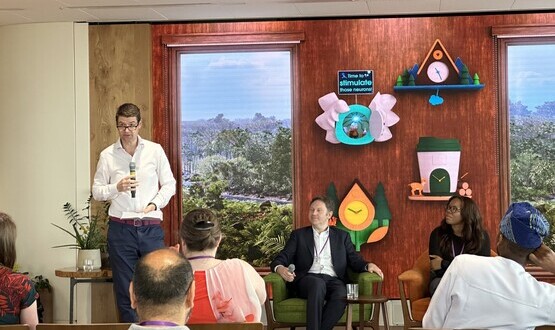Digital Health Networks debate on levelling up and convergence
- 10 October 2022

Our second Digital Health Networks debate was focused on levelling up and convergence policies. Hannah Crouch reports.
Reports from the last few months have suggested that the centre of the NHS wants to move towards policies of levelling up and convergence.
Convergence has so far been framed as standardisation of electronic patient record systems, while levelling-up has been defined as directing national investment on those least digitally mature organisations.
However, there has been relatively little debate or formal policy discussion as to whether EPR standardisation makes sense, and whether it offers the best dimension of digital maturity to focus on
The Digital Health Networks asked some of its members to take part in a debate on these new policies.
Good definition is key
First up, our panel explored the importance of having clear definitions for people to work with when it comes to convergence.
For Adrian Byrne, CIO at Southampton University Hospital NHS Foundation Trust, and former chair of the CIO Network, levelling up and convergence does make sense, but there are some details which need to be ironed out.
“I can’t argue the concept, but it is about how you get there, what are the priorities and what needs to be done first,” he said.
“There is convergence and then there is divergence and clearly, we don’t want to see divergence
“I think what we lack now is a good definition, it’s a principle at the moment, it doesn’t really have a solid definition.
“How do we know when we have achieved it? How do we know What Good Looks Like in the context of convergence?”
He added that the sector needs to “find some direction and definition”.
The problem of lack of definition was echoed by Debbie Loke, CIO and director of digital at University Hospitals of Derby and Burton NHS Foundation Trust.
“Everyone seems to have a different view and then equally, each system is looking at their own areas and deciding whether convergence is more important than levelling up,” she said.
“In Derbyshire, we’re looking at convergence of an electronic patient record (EPR) across two acutes and we’re not focusing on any other area, which we know that will take us backwards in our HIMMS journey, but that’s the decision we’ve made to move forward with the convergence piece.
“I know others are doing different things so it will be good to get a policy view on whether what we are doing is right, or wrong.
“There’s a lack of direction I think from the national teams about how we should be managing that.”
Help from suppliers
Sticking with support from the centre, Loke highlighted the potential for national organisations to help with suppliers.
“There’s a real need for local systems to be able to make their own decisions about direction and use national policy and finding to support that,” she said.
“I think there is something the national teams can be doing is to help with the suppliers, I do think there is extra work they could do there with the monopolised areas like primary care.
“The national teams do allow suppliers on their frameworks and actually, if we’ve all got really bad reviews from certain suppliers and they’re not meeting our needs, there’s a question as should they even be on the framework?”
Market and competition
Byrne also addressed the issue of market weaknesses and lack of competition.
“We talk endlessly about standards in digital and then we seem to be quite poor at implementing them and some of that is actually the market isn’t very rich and we could argue that we stifle that market in some ways,” he said.
“If we look at primary care, we have succeeded in creating a dominance for two vendors there by doing what we’ve done.
“I don’t think we really want to be in that situation in the rest of the health service, but we are constrained by the market so you’ve got a tension there.
“I’d like to think that we could work a way though it and end up with a choice of systems, that will be based on some more modern architecture but more adaptable really.
“I know we talk about standards on one side, and we talk about all the wonderful things like FHIR and openEHR and then we go and sign massive contracts with your favourites who are on 30/40-year-old technology. It doesn’t seem to compute to me.”
Working collectively
On the topic of differentiating between levelling up and convergence, Loke spoke about priorities.
“In my view, it [levelling up] is pretty much the same thing as convergence,” she said.
“I think it’s all about looking at what the problems are across our system and then making sure we work collectively to review them and for some areas, it just means moving to different systems or processes or using the right levels of integration to help each other out.
“I think that they are kind of very much inter-linked but it’s all dependent on our own systems’ needs and populations and where the priorities are.
“I do think some of the levelling up around transformation is a bit more difficult because, as I said, it’s not always about digital and data, some of it is about how we transform working practices and level that up and I am not sure always who leads on that at system level.”
Looking at the money
On a final note, chair of the debate, Dr Paul Rice – who is chief digital information officer at Bradford Teaching Hospitals NHS Foundation Trust – spoke about the all-important subject of finance.
“I’d underscore that for colleagues – that question of how do we get the numbers to align with the aspiration,” he said.
“I agree with the point that we need to make sure that finance function in particular is aligned or else we’re trying our best to present medium to long term plans, aligned plans, converge plans and then in practice, the money doesn’t chime with that approach and that’s why we’re in some real difficulties now.”





2 Comments
why isnt this recorded in either video or audio, or at least transcribed – would be much more useful for summaries alongisde the actual conversation
I’ll tell you what is Good and Bad in convergence. If your wife is taken by ambulance to a hospital which does not hold her records (as happened to mine 16 days ago) and all her data can be spued immediately and electronically to the hospital treating her, then that is Good. If only fragmentary textual info can be sent after several hours, that is Bad. Bad for the patient and inadequate and time-consuming for the clinicians treating her.
By this simple test, what happened was BAD. The two hospitals are five miles apart.
I suggest, as a humble patient, that the people discussing convergence in the above article sharpen up. The scenario I describe must be repeated teh thousand time across the country, as ambulances are diverted nightly.
By this
Comments are closed.